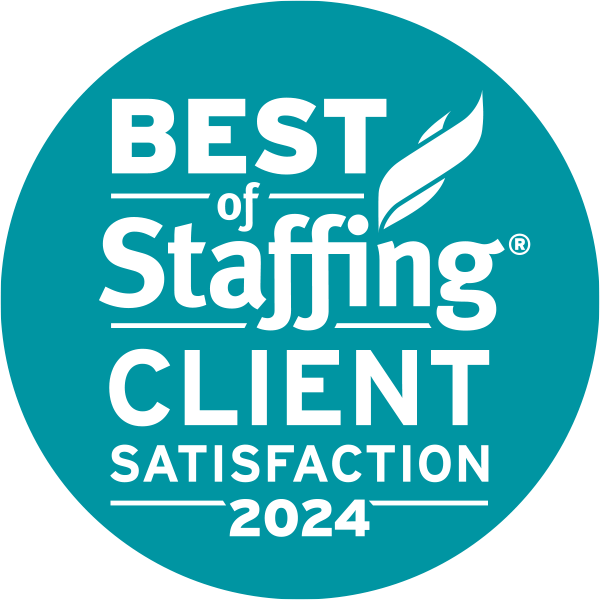
Job interviews can be incredibly nerve wracking. After all, you’re essentially selling the value you can contribute to a potential employer—a tall order for your average 30-minute interview. But remember that interviews are a two-way street. It’s super important that you ask questions too—for a few reasons:
- To show your interest in the role and company.
- To determine if the role and company are the right fit for you.
- To demonstrate that you’re invested in a mutual fit for the long haul.
Interviewing your interviewer is nothing new. In fact, we covered the notion in depth in Don’t Be Shy! Top ‘Must-Ask’ Interview Questions for Job Candidates. And while this guidance still holds true, there’s always room for more. Here, we’re circling back to help you really stand out in a competitive landscape.
By asking thoughtful questions, not only will you gain a better understanding of the company’s culture and values, but you’ll also set yourself up for future success in the role. With clarity and context, you’ll be prepared to start strong with a new organization.
Here are the six smart questions to ask your interviewer.
1. “How does the company support employee development and growth?”
At no point in your career (or life) are you truly ever done learning. For serious jobseekers dedicated to continuous learning to bolster their career and deliver greater value to their team, employer-supported career development opportunities are critical.
It’s easy for a company to simply say they support employee development, but the “how” is really where they demonstrate their commitment to employee growth. By asking this question, you’ll get a sense of the training and development opportunities, technologies and programs you’ll have access to. You can even ask how your role might include learning and development opportunities away from the office like conferences, classes or networking opportunities.
If the company consistently and intentionally invests in employee growth and development, this is a good sign that they value their employees and are committed to their long-term growth and success. This is key if you’re looking for a career rather than just a job.
2. “Can you walk me through the company’s management style and decision-making process?”
Understanding the company’s management style and decision-making process is crucial to success in any role—whether it’s an entry-level position or a management position.
By asking this question, you’ll get a sense of how decisions are made, how work is prioritized, and how collaborative the company is. If you prefer a more collaborative approach, for example, you’ll want to make sure that the company values teamwork and embraces failing forward as a way of learning.
If you’re interviewing for a management position, consider asking about the company’s approach to personal development, which should be an ongoing priority and encouraged by leadership. Developing and refining the core skills you need to successfully manage people—emotional intelligence, empathy, patience and problem solving—is a key piece in becoming a transformative leader.
3. “What are the biggest challenges facing the team or the company, and how are they being addressed?”
Even the most put-together companies have their roadblocks. No company will ever be perfect—but knowing what challenges they face before diving in head-first will demonstrate your willingness to tackle tough problems.
With just this one question, you’ll gain insight into:
- How they company handles difficult situations
- The company’s problem-solving approach
- How adaptable and resilient the company is
- What you’ll be working on and the kind of impact you’ll have
This can also act as a proactive measure to protecting your own professional integrity, core values, and quality of life—depending on the company’s situation. Nobody wants to enter a new work environment where issues are being brushed under the rug.
4. “What is the company’s long-term vision and goals, and how are you actively working towards them?”
For candidates like yourself looking to make a more permanent career move rather than hopping from one job to the next, resonating with a company’s long-term vision and goals is critical to determining if the role and company are a good fit for you. If their vision aligns with your own personal and professional goals, you’ll be more likely to feel fulfilled in your role and motivated to contribute to the company’s success.
But simply knowing what a company’s mission, vision and values statements are on paper is just the beginning. What are the folks in charge doing to progress the company toward achieving these goals? And how are employees outside of leadership expected to move the needle forward? Make sure you gain a clear understanding of the expectations before signing on.
5. “Can you tell me about opportunities for advancement?”
Yet another critical question to ask your interviewer(s)—especially if you’re seeking a full-time role to build a healthy and prosperous career. This question will offer further insight into question number-one, with a stronger focus on your personal longevity at the company vs. professional development.
This is also your opportunity to feel out whether the organization is forward-thinking and intentional with their hires. Not only does this matter for your potential tenure at the company and the future of your career, but it also serves as a solid indicator of the company as a thought leader in their industry.
One of the many key qualities of forward-thinking organizations is demonstrating current-state awareness and future-state vision—meaning they value dreaming big, but they also stay realistic and set manageable milestones for the team. Only the most forward-thinking organizations will earn true loyalty from their people through their investment in internal advancement.
6. “How does the company define and measure success?”
Lastly, we recommend asking this question to gain a clear understanding of how the company both defines and measures success—as an organization and as a gauge of your effectiveness in your role. By including this in your list of questions for your interviewer, it’ll show that you’re already invested in the company’s success and you’re clear on how you’ll contribute to those efforts.
It’s assumed that most organizations define success in terms of financial metrics. This makes absolute sense given that Merriam-Webster defines success as the attainment of wealth, favor or eminence. But success is not just about the money. High retention, customer satisfaction, employee engagement and industry accolades are just a few examples of non-monetary signs that a company is on the rise.
Knowing your future company’s approach to measuring success will give you visibility into both the goals set forth by the organization and the personal goals you’ll define for yourself.
Ready to Crush Your Next Interview? Peoplelink Staffing Will Set You Up for Success
Taking the time to feel prepared before going into your next interview might feel like a lot of work at first. But we guarantee you’ll be glad you did. It’s much easier to gain clarity around the most important details before you join a new organization. Trust us—there are few worse feelings than encountering some unpleasant surprises at your new job and wondering if you made a mistake.
No matter how many free resources like this article are available to you, we recognize that preparing for an interview can still be overwhelming on your own—especially if you’re not sure where to start.
That’s where Peoplelink Staffing comes in.
Our patented and trademarked six-step risk prevention program allows us to dig deeper into your career goals and workplace needs, and properly prepare you to feel your most confident in your upcoming interviews. Whether you’re a recent graduate or a seasoned professional, our team of experienced coaches can help you refine your interview skills, craft compelling responses to common interview questions, and develop strategies for asking thoughtful questions.
If you’re looking to crush your next interview, connect with Peoplelink today. Let’s set you up for success.





